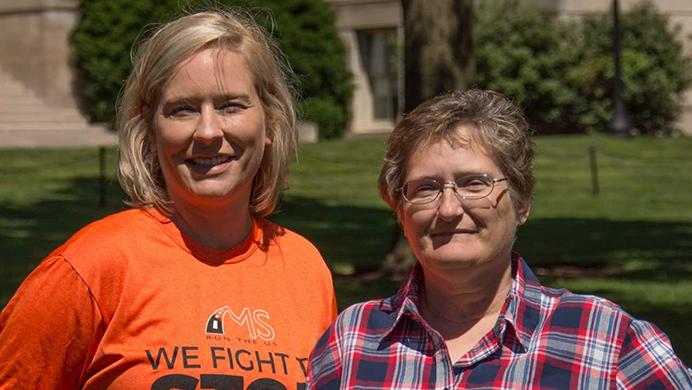Amanda Scott, a University of Iowa Hospitals and Clinics employee, will run from Des Moines to Davenport this week — 176 miles in seven days.
She undertakes the multiple-marathon challenge as part of MS Run the U.S., a cross-country relay that raises money and awareness for multiple sclerosis.
Beginning in Los Angeles in April and ending in New York City in August, 18 runners will cover more than 3,000 miles. Each runner must raise at least $10,000. Since its founding five years ago, the MS Run has raised more than $1 million, community engagement manager Amy VanDyke said.
It’s important to make connections with communities in order to raise awareness, she said, so that there’s “not just a runner running through town, and no one knows why.” Many runners will stop in towns for meet-and-greets or invite others to run alongside them.
Scott won’t run alone the whole time — a group from her gym and the Prairie High track team will run alongside her for part of the trek.
Scott said she learned about the MS Run while searching for MS groups on Facebook last year. Her mother Deana and sister Sami both have MS.
“It got to the point where [my sister] was confined to the house,” Scott said.
She applied to the organization on a whim and promptly forgot about it, until MS Run called back for an interview a month later, Scott said. Suddenly, Scott, who had never run a marathon before, had to prepare for seven-consecutive marathons.
Luckily, she had the proper mindset — she said she’s “always had a passion for wanting to help people” from when she baby-sat her younger siblings to her current job in Patient Financial Services at the UIHC.
“I don’t think it would surprise anybody who knew her,” family friend Josh Whetstine said.
Deana Scott described her daughter as a bright spot of sunshine in her family’s lives, who’s always willing to give to others and “inspire us when we’re down.”
Scott was only 7 years old when her mother was diagnosed. At the time, all Scott knew was that her mother sometimes couldn’t get out of bed and would come home from the hospital with her face puffed up from steroid treatments.
In 2009, Sami, who was then 24, began experiencing episodes of numbness and impaired vision. Scott and her father were convinced it couldn’t be MS; after all, the disease is not hereditary.
But Deana knew, she said. Within a year, Sami’s mobility decreased from a cane to a walker to a wheelchair. A visit to Mayo Clinic in Rochester, Minnesota, confirmed the diagnosis.
Unlike her mother, who has Relapsing-Remitting MS, Sami has Primary-Progressive, which slowly gets worse over time. She’s 32 now, with three children. Her 11-year-old cooks dinner most nights because Sami is unable to.
“It angers me that she’s literally had her life taken from her,” Scott said.
When it comes to the run, though, her sister’s struggles keep Scott on track.



